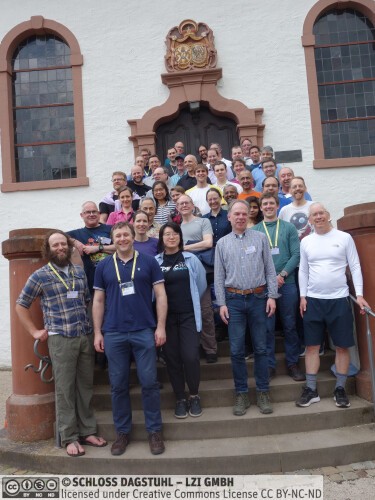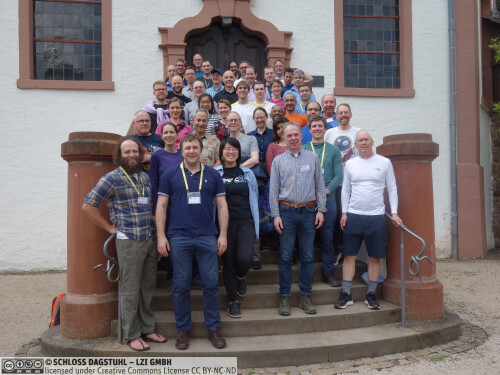Dagstuhl Seminar 24201
Discrete Algorithms on Modern and Emerging Compute Infrastructure
( May 12 – May 17, 2024 )
Permalink
Organizers
- Kathrin Hanauer (Universität Wien, AT)
- Uwe Naumann (RWTH Aachen, DE)
- Alex Pothen (Purdue University - West Lafayette, US)
- Robert Schreiber (Cerebras Systems - Palo Alto, US)
Contact
- Michael Gerke (for scientific matters)
- Jutka Gasiorowski (for administrative matters)
Schedule
- Schloss Dagstuhl (and a Seminar and Cerebras), Jakob Engblom's trip report with notes on Dagstuhl Seminar 24201 in his blog Observations from Uppsala, June 22, 2024.
We are happy to report on a lively and productive scientific discourse on discrete algorithms on modern and emerging compute infrastructure. As always, Dagstuhl presented an ideal setting for this kind of interdisciplinary meeting of experts from diverse backgrounds.
The aim was to identify requirements for
- discrete algorithms imposed by emerging compute infrastructure;
- emerging compute infrastructure imposed by discrete algorithms;
- curricula at universities aiming to educate the next generation of designers of novel discrete algorithms as well as of future compute infrastructure.
We focused on sparse linear algebra and graph algorithms while reaching out to a diverse set of representatives from industry combining expertise in modern accelerators, next-generation silicon, and quantum computing.
Research questions addressed included the following:
- How should today's discrete algorithms be re-designed in order to meet the requirements of emerging compute infrastructure?
- Can lessons learned while mapping discrete algorithms onto modern compute infrastructure be (partially) generalized for emerging compute infrastructure?
- What are implications for (combinations of) deterministic, stochastic, and data-driven methods?
- What impact on the design of discrete algorithms and their implementation can be expected from likely hierarchy / heterogeneity in emerging compute infrastructure?
- How can emerging compute infrastructure be tailored towards the needs of practically relevant discrete problems and their algorithmic solution?
- How do we support irregularity and dynamics inherent in sparse linear algebra and graph problems by suitable hardware architecture / system software?
- What do suitable programming models / languages look like?
- How could we account for memory-boundedness?
Following individual 5 min introductions, the program consisted of three plenary talks, four plenary focus sessions / panel discussions, and four non-plenary working groups. Refer to the respective abstracts for details.
 Kathrin Hanauer, Uwe Naumann, Alex Pothen, and Robert Schreiber
Kathrin Hanauer, Uwe Naumann, Alex Pothen, and Robert Schreiber
Discrete algorithms developed within the scope of combinatorial scientific computing, applied discrete mathematics, algorithm engineering, combinatorial optimization and theoretical computer science have been growing in importance over the past decades and are highly likely to continue doing so in the future. Graph algorithms and sparse linear algebra have become significant components of emerging applications such as scientific machine learning, data analytics, computational biology, cybersecurity and a myriad of other fields. Continuous numerical simulations in computational science and engineering often yield discrete sub-problems related to optimized mapping of the given algorithm to the available compute infrastructure comprising the hardware (combining CPU hosts with a variety of dedicated accelerators via high-speed interconnects and featuring an often complex distributed memory hierarchy) as well as associated system software (operating system, programming models and languages, compilers, runtime support libraries).
In-depth understanding of both hardware and system software layers turns out to be essential. A variety of conceptual as well as technical challenges need to be addressed. Emerging compute infrastructure imposes constraints on the design of discrete algorithms. Future developments are likely to imply even more fundamental adaptations of existing and emerging algorithms. Close collaboration of developers of algorithms with their colleagues from the high-performance computer industry turns out to be crucial for the formulation of meaningful requirements on both sides.
We intend to focus on sparse linear algebra and graph algorithms while reaching out to a diverse set of representatives from industry combining expertise in modern accelerators, next-generation silicon, quantum and neuromorphic computing. Specific questions to be addressed include the following:
How do today's discrete algorithms have to be re-designed in order to meet the requirements of emerging compute infrastructure?
- Can lessons learned while mapping discrete algorithms onto modern compute infrastructure be (partially) generalized for emerging compute infrastructure?
- What are implications for (combinations of) deterministic, stochastic and data-driven methods?
- What impact on the design of discrete algorithms and their implementation can be expected from hierarchy / heterogeneity in emerging compute infrastructure?
How can emerging compute infrastructure be tailored towards the needs of practically relevant discrete problems and their algorithmic solution?
- How to support irregularity and dynamics inherent in sparse linear algebra and graph problems by suitable hardware architecture / system software?
- What do suitable programming models / languages look like?
- How to account for memory-boundedness?
We aim for improved mutual understanding through closer collaboration between researchers in discrete and combinatorial algorithms and developers of high-performance compute infrastructure. The findings of this Dagstuhl Seminar are meant to be formulated as a road map supporting the coordinated evolution of discrete algorithms and compute infrastructure.
 Kathrin Hanauer, Uwe Naumann, Alex Pothen, and Robert Schreiber
Kathrin Hanauer, Uwe Naumann, Alex Pothen, and Robert Schreiber
- Cevdet Aykanat (Bilkent University - Ankara, TR) [dblp]
- David A. Bader (NJIT - Newark, US) [dblp]
- Paolo Bientinesi (University of Umeå, SE) [dblp]
- Erik Boman (Sandia National Labs - Albuquerque, US) [dblp]
- Martin Bücker (Friedrich-Schiller-Universität Jena, DE) [dblp]
- Jason Charlesworth (Zettamatics - Manningtree, GB)
- Cedric Chevalier (CEA - Bruyères-le-Châtel, FR) [dblp]
- Alex Crane (University of Utah - Salt Lake City, US)
- Jakob Engblom (Intel Sweden - Kista, SE) [dblp]
- John Gilbert (University of California - Santa Barbara, US) [dblp]
- Chris Goodyer (Arm - Manchester, GB) [dblp]
- Inge Li Gørtz (Technical University of Denmark - Lyngby, DK) [dblp]
- Oded Green (NVIDIA - Alpharetta, US)
- Kathrin Hanauer (Universität Wien, AT) [dblp]
- Bruce Hendrickson (LLNL - Livermore, US) [dblp]
- Paul D. Hovland (Argonne National Laboratory, US) [dblp]
- Nidhi Kaihnsa (University of Copenhagen, DK)
- Gero Kauerauf (RWTH Aachen, DE)
- Neil Kichler (RWTH Aachen, DE)
- Daniel Král' (Masaryk University - Brno, CZ) [dblp]
- Johannes Langguth (Simula Research Laboratory - Oslo, NO) [dblp]
- Klaus Leppkes (Ex-Luminary Cloud - Redwood City, US)
- Quanquan C. Liu (Yale University - New Haven, US) [dblp]
- Johannes Lotz (NAG - Oxford, GB) [dblp]
- Fredrik Manne (University of Bergen, NO) [dblp]
- Henning Meyerhenke (HU Berlin, DE) [dblp]
- Uwe Naumann (RWTH Aachen, DE) [dblp]
- Manuel Penschuck (Goethe University - Frankfurt am Main, DE) [dblp]
- Alex Pothen (Purdue University - West Lafayette, US) [dblp]
- Arash Pourdamghani (TU Berlin, DE)
- Henrik Reinstädtler (Universität Heidelberg, DE)
- Eleanor Rieffel (NASA - Moffett Field, US) [dblp]
- Ilya Safro (University of Delaware - Newark, US) [dblp]
- Robert Schreiber (Cerebras Systems - Palo Alto, US) [dblp]
- Christian Schulz (Universität Heidelberg, DE) [dblp]
- Angelika Schwarz (Sona, SE)
- George Slota (Rensselaer Polytechnic Institute - Troy, US) [dblp]
- Sergii Strelchuk (University of Warwick - Coventry, GB)
- Blair D. Sullivan (University of Utah - Salt Lake City, US) [dblp]
- Sivan Toledo (Tel Aviv University, IL) [dblp]
- Bora Uçar (ENS - Lyon, FR) [dblp]
- Nate Veldt (Texas A&M University - College Station, US) [dblp]
- Helen Xu (Georgia Institute of Technology - Atlanta, US) [dblp]
Classification
- Data Structures and Algorithms
- Discrete Mathematics
- Emerging Technologies
Keywords
- Data Structures and Discrete Algorithms
- Emerging Compute Infrastructure





 Creative Commons BY 4.0
Creative Commons BY 4.0
